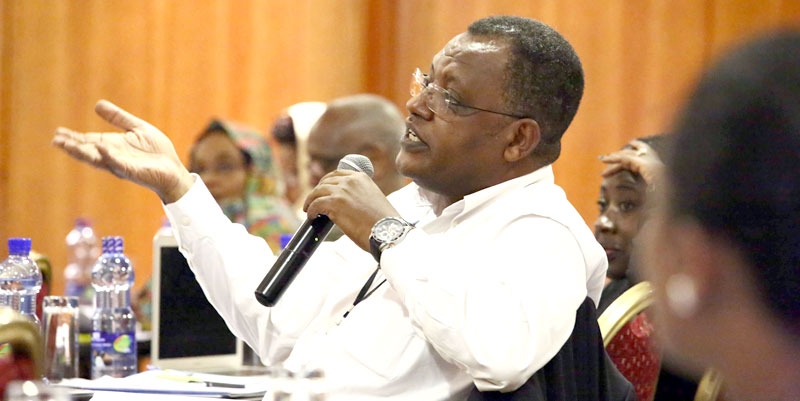human traffickingFeatures
Uganda’s failure to enact a biosafety law a setback for other COMESA countries
COMESA’s Senior Biotechnology Policy Adviser,” width=”800″ height=”401″ />
Dr. Getachew Belay, COMESA’s Senior Biotechnology Policy Adviser,
The Common Market for Eastern and Southern Africa (COMESA) is a trade area comprising 19 African countries including Uganda. In 2014, COMESA member states approved and adopted the COMESA Policy on Biotechnology and Biosafety. Through its specialised agency, the Alliance for Commodity Trade in Eastern and Southern Africa (ACTESA), COMESA is now implementing a plan to support the member states to realise their potential in the global biotechnology enterprise. During a recent communication training workshop for Media practitioners on biotechnology and biosafety held in Addis Ababa, Ethiopia, The Sunrise’s William Odinga Balikuddembe spoke to Dr. Getachew Belay, COMESA’s Senior Biotechnology Policy Adviser, about the status and potential of modern agricultural biotechnology for the regional bloc. Below are excerpts:
Qn: Why modern biotechnology for the COMESA region?
Ans: COMESA is about trade and investment. To trade we have to increase production and productivity. In addition, the region has become more vulnerable to climate change and pests. Biotechnology may not solve all our problems but it gives us the opportunity to increase productivity and production through crop protection and adaptation. Now countries are moving into industrialisation, like textile and agro-processing and Africa has to fill the raw material supply gap. This technology can contribute in several ways in filling that gap and increasing competitiveness.
Qn: What is the current status of trade in agricultural produce in the COMESA region?
Ans: Much of the trade in crops is cross border and a good percentage is done informally. In most countries, the food import bills are high and much of it comes outside the region. Countries like Zambia, which produce in good quantities, export to neighboring countries. However, there is the arbitrary imposition of import and export bans and application of tariff and non-tariff barriers which have exacerbated poor movement of food across borders and drastically increased informal cross border trade and is affecting intra-regional trade. Poor and inefficient market structures have further limited access to food in many countries in the region.
The establishment of the Alliance for Commodity Trade in Eastern and Southern Africa (ACTESA), which is specialized agency of COMESA, is to enhance intra-regional trade through harmonized policies, market development and by building capacity for commercialization. To do that, you need to know where the surplus production is so that it can be taken to other areas where it is needed. So there is a lot to be done to improve the situation.
Qn:What is the current status of Biotechnology and biosafety in the COMESA region?
Ans: There is a regional policy which took us a decade to develop and we also have a validated implementation plan of the Policy. The Policy recognizes the sovereign rights of member States in decision making of adopting the technology. At individual country level, it is variable. Without biosafety systems in place you can’t start trials. Kenya, Ethiopia, Malawi, Sudan, Swaziland, Zambia and Zimbabwe have their laws.
However, Sudan is the only country amongst the COMESA states which has commercialised – producing and selling Bt-cotton [genetically modified cotton that is resistant to the destructive ball-worm]. Malawi, Swaziland and Ethiopia are testing Bt-cotton as well. Kenya is testing maize, cotton, potatoes. Uganda did the reverse – they started trials without the law, but have built an impressive local capacity.
Zambia has the law but it is stringent and unworkable; therefore they are considering to revise it. Zimbabwe has an enabling biosafety act, but it has not started trials. The rest of the countries have no relevant policy so there is no substantive activity. In general, the pace of adopting biotechnology amongst COMESA member states is slow, but the speed of product testing is increasing.
Qn: What challenges are you facing in implementing the Policy?
Ans: The first challenge is the level of understanding about this technology. Many people’s perception is still negative. We also have policy reversals; Kenya and Egypt provide examples of uncertainties on what happens next. Egypt had started cultivating Bt-maize but government stopped it after the revolution. Kenya imposed an import ban following a journal report which was reprimanded later. That means, one political pronouncement and everything could change. There is also negative activism. The institutional alignment within the countries also has to improve. For example one government organ can say the technology can be useful and another organ of the same government takes a different line.
Qn: Uganda is grappling to enact her biosafety law. What is your comment on that?
COMESA comprises member states which have to benefit from each other. Countries like Uganda have developed capacity in this technology but the process of having a law there has stalled. When the process stalls it is a setback for the rest of the COMESA countries. When we share experience amongst countries people feel confident. Uganda can also learn from other COMESA member States;having a biosafety act does not necessarily mean that the country will be flooded with biotech products the next morning. We have to strengthen the learning process amongst COMESA member countries. I hope that by Uganda enacting the law, it will play a more active and leading role soon.
Qn:What is the future outlook for this technology in the COMESA area?
Ans: Personally, I am positive. We have progressed in biotechnology and biosafety development in Africa. Some years back we were not even talking about it. As stakeholders learn more, attitudes are changing from “rejection” to “let’s give it a chance”. Even other agricultural revolutions came late to Africa. That time may be we were not ready. Remember hybrid maize? People were skeptical and slow to adopt it but now look, hybrid maize is everywhere. What happens elsewhere will happen in Africa as well. It is a matter of time!
Comments



















